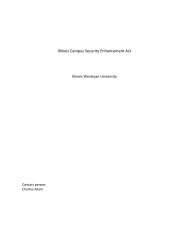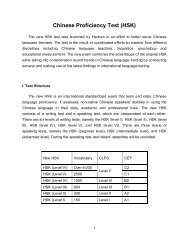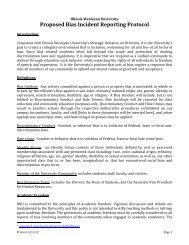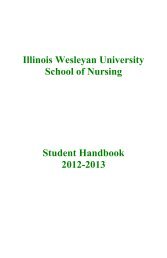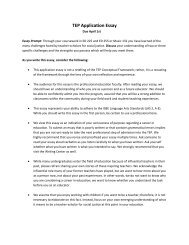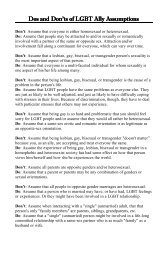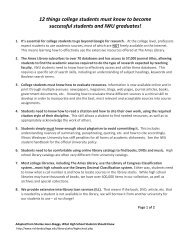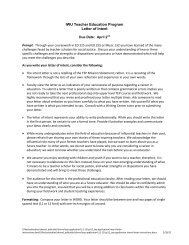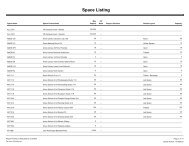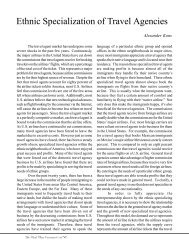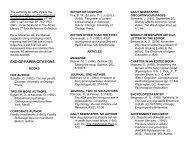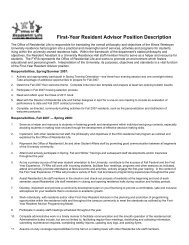ED 201 - Historical and Philosophical Foundations of Education ...
ED 201 - Historical and Philosophical Foundations of Education ...
ED 201 - Historical and Philosophical Foundations of Education ...
You also want an ePaper? Increase the reach of your titles
YUMPU automatically turns print PDFs into web optimized ePapers that Google loves.
writer will demonstrate logical reasoning <strong>and</strong> support her/his arguments with relevant<br />
evidence but will not take any chances or reach beyond a conventional underst<strong>and</strong>ing <strong>of</strong><br />
the material.<br />
5) “B-” papers are solid pieces <strong>of</strong> work with one or two slight exceptions. The author will<br />
demonstrate general familiarity <strong>and</strong> engagement with important issues but may miss the<br />
implications <strong>of</strong> one important argument or make a statement that is empirically <strong>and</strong><br />
factually incorrect. Still this will not take away from a general underst<strong>and</strong>ing <strong>of</strong> the issues<br />
at h<strong>and</strong>.The paper will for the most part be well organized, but there may be a particular<br />
paragraph that is stylistically or grammatically inappropriate.<br />
6) "C" papers are adequate pieces <strong>of</strong> work that demonstrate acceptable underst<strong>and</strong>ing <strong>of</strong><br />
the assignment. The insights <strong>and</strong> ideas presented will rarely go beyond the obvious <strong>and</strong><br />
there may be some organizational <strong>and</strong> stylistic inconsistencies that detract from the<br />
content <strong>of</strong> the piece. It is generally clear that the author underst<strong>and</strong>s the nature <strong>of</strong> the<br />
assignment <strong>and</strong> appreciates her/his role <strong>and</strong> that <strong>of</strong> the audience for whom the piece is<br />
intended. But the use <strong>of</strong> evidence <strong>and</strong> logical argument while present throughout the<br />
piece, is limited. Sometimes, one argument will be clearly delivered but opposing points<br />
<strong>of</strong> view will not be considered. Clarity <strong>of</strong> expression is present although it may be<br />
seriously lacking in a few areas. Grammatical <strong>and</strong> spelling errors may be present, but one<br />
can still underst<strong>and</strong> the author’s intention <strong>and</strong> meaning. C+, C, <strong>and</strong> C- grades will differ<br />
depending upon how well the author communicates her/his underst<strong>and</strong>ing <strong>of</strong> the<br />
assigment, <strong>and</strong> demonstrates evidence for having completed the required reading in its<br />
entirety.<br />
7) "D" papers may have some virtues: an occasional insight or good idea, but they are<br />
marred by unclear writing, organization, <strong>and</strong> style. They demonstrate lack <strong>of</strong> attention to<br />
audience <strong>and</strong> communicate the purpose <strong>of</strong> the piece unclearly, <strong>and</strong> they are lacking in the<br />
presentation <strong>of</strong> solid argumentation <strong>and</strong> evidence. Upon reading this type <strong>of</strong> paper, one<br />
can’t be absolutely sure that the author underst<strong>and</strong>s the assignment <strong>and</strong> has read the<br />
required material, necessary to complete the assignment intelligently. Grammatical <strong>and</strong><br />
spelling errors are abundant.<br />
8) "F" papers fail to address the requirements <strong>of</strong> the assignment. Their authors show no<br />
insight into the work being studied <strong>and</strong> show poor attention to organization <strong>and</strong> style.<br />
These are papers that <strong>of</strong>ten are written at the last minute <strong>and</strong> do not clearly demonstrate<br />
that the author underst<strong>and</strong>s her/his role or the nature <strong>of</strong> the audience for whom the work<br />
is to be written. No evidence is given to demonstrate that the author has actually read the<br />
required material or completed the required tasks prior to writing this paper. No effort is<br />
made to organize one's thoughts clearly.<br />
All formal written work for the course should be pro<strong>of</strong>read <strong>and</strong> spell checked before<br />
being turned in.



